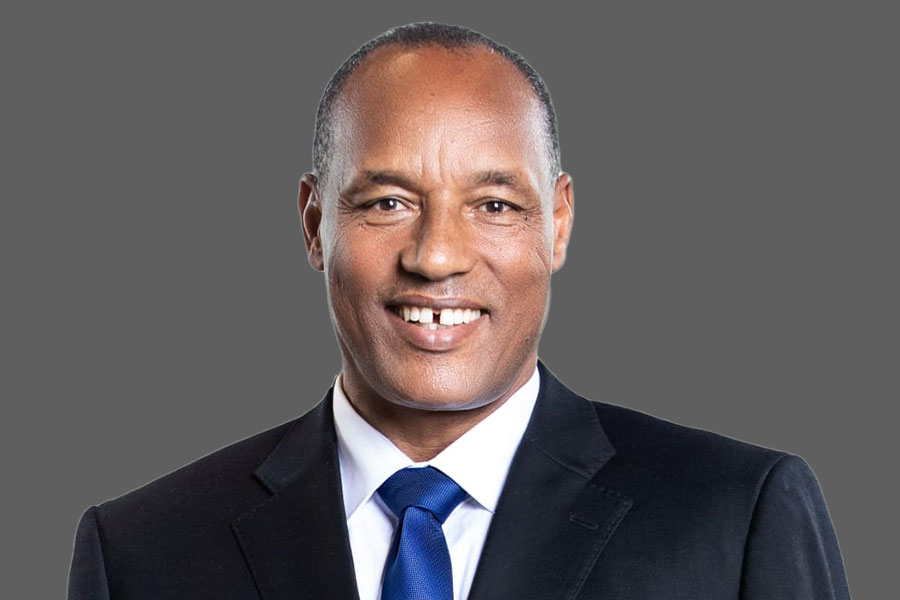
Jul 27 , 2024.
National Bank Governor Mamo Mehiretu recently etched his name in the annals of Ethiopia’s central banking by signing a memorandum of understanding with Khaled Mohammed Balama, governor of the United Arab Emirates (UAE) central bank. The historic currency swap agreement, which bypasses the Dollar as an intermediary, applies to an exchange limit of a little over 800 million dollars between the Birr and the Dirham.
The currency swap marks Ethiopia's first such deal, although the UAE already has a similar agreement with Egypt worth 1.4 billion dollars. Due to the ongoing civil war, its discussions with Sudan for similar deals remain on hold.
Over the past five years, the UAE's role in Ethiopia's economy has grown immensely, positioning the Gulf country as Ethiopia’s fourth-largest trading partner after China, the United States, and India. Investments from the UAE reached 2.9 billion dollars in 2022, focusing primarily on food and chemicals. Bilateral trade value surged by 180pc over the previous five years, hitting 2.5 billion dollars. In 2022 alone, Ethiopia exported gold, coffee, and livestock worth nearly 150 million dollars to the UAE while importing 589 million dollars worth of goods, mainly vehicles, medicines, and fertilisers.
Entering a historic currency swap deal with one of its largest trade partners is expected to yield practical benefits for Ethiopia, such as cost savings and strengthened bilateral relations. For its policymakers, the immediate goals include reducing the volatility of the Birr and boosting investor confidence by addressing exchange rate risks. They are also eager to reduce the country's reliance on the US Dollar and seek to trade with the UAE in domestic currencies.
Both countries stand to benefit from reduced exposure to Dollar fluctuations, leading to more predictable trade terms. Eliminating intermediary conversion fees can hopefully translate to cost savings, which could be reinvested in economic development projects. The agreement would also strengthen political and economic ties between the countries, paving the way for further cooperation.
Historically, the Dollar has been the bedrock of international trade, but the rise of currency swaps foretells a shift toward economic policy sovereignty. By directly exchanging their respective currencies, countries can reduce transaction costs, enhance bilateral trade, and diversify their reserves. Maintaining large Dollar reserves can be limiting; hence, diversifying into other currencies, countries can achieve a more balanced portfolio, better equipped to handle global economic fluxes.
Heavy reliance on the US Dollar subjects countries to the United States' monetary policy and economic conditions, and volatility in the Dollar's value can impact trade balances and economic stability. Using the Dollar as an intermediary involves multiple currency conversions, each incurring fees and potentially unfavourable exchange rates. Direct currency swaps are seen as a policy tool to eliminate these additional costs, making international trade more cost-effective. By swapping their respective currencies, countries can reduce exposure to external factors and gain greater control over their economic fate.
However, despite the growing interest in currency swaps, the US Dollar remains a prevalent choice for settling international transactions due to the widespread acceptance, trust, and liquidity it has enjoyed since the Second World War. The Dollar facilitates smoother and quicker transactions and can be easily converted into local currencies. The relative stability of the US economy adds to the dollar's charm, providing stability to transactions conducted with the green buck. Several international financial systems and institutions are built around the Dollar, facilitating the process of conducting and settling transactions.
Ethiopia pegged its Birr to the US Dollar in 1945 to stabilise its economy. The stable currency peg was intended to make it more attractive to foreign investors by reducing exchange rate risk, aiding businesses in planning and budgeting effectively, and attracting long-term investments and trade agreements. However, pegging the Birr to the Dollar affected export competitiveness by making goods from Ethiopia more expensive on the international market, reducing demand.
Successive governments have had to balance these considerations to support the growing export sector, particularly agricultural commodities. In the 1990s, Ethiopia began moving towards a more flexible exchange rate system under pressure from international financial institutions like the International Monetary Fund (IMF). The shift was part of broader economic reforms intended to open the economy, including deregulation, privatisation, liberalisation and measures to create a more business-friendly environment.
Three decades of such experiments in economic policy reforms have led to major macroeconomic imbalances. Despite exponential GDP growth and substantial gains in public infrastructure and social and economic fronts, the high cost of living has become unbearable for the majority, with household incomes eroded by double-digit inflation stubborn for almost two decades. The trade deficit is so large that the country’s foreign currency reserves cannot cover one month of imports.
It should be understandable if signing a currency swap deal is seen as one alternative to responding to this entrapment.
A currency swap is a financial arrangement between two parties to exchange principal and interest payments in different currencies over a specified period. At the outset, the parties exchange principal amounts based on the current exchange rate. Each party pays interest on the principal amount received in the other currency throughout the swap's duration. Interest rates can be fixed or floating, depending on the terms of the agreement.
Nonetheless, the specific terms of Governor Mamo's deal have yet to be disclosed.
The currency swap can provide several advantages for businesses dealing with UAE companies. It allows them to hedge against currency risk by locking in exchange rates for the duration of contracts. For instance, an Ethiopia-based company importing machinery from the UAE can use a currency swap to exchange Birr for Dirham at a fixed rate, insulating itself from future exchange rate fluctuations. Currency swaps can result in lower borrowing costs than directly borrowing in a foreign currency, whether the Dollar or the Euro. This is particularly relevant for companies with strong credit histories in Ethiopia but limited access to international markets.
In addition to risk management, currency swaps provide access to foreign capital markets, allowing Ethiopian companies to raise funds in Dirhams without directly entering those markets. They also help companies manage their balance sheets more effectively by converting debt in Birr into Dirham, reducing exposure to currency fluctuations and improving financial reporting.
However, currency swaps also have limitations.
They can limit potential gains from favourable exchange rate fluctuations. If the Birr appreciates against the Dirham, a currency swap could prevent an Ethiopian company from benefiting from lower costs when importing goods. Currency swaps can also be complex financial instruments requiring a thorough understanding of foreign exchange markets and interest rate dynamics. Companies without the necessary expertise may face risks in structuring and managing these swaps effectively.
Currency swaps carry counterparty risk, such as one party defaulting on its obligations. To address this risk, companies need to conduct due diligence on their swap counterparties and consider their creditworthiness. In times of financial distress or market dislocation, the cost of entering or unwinding a currency swap may increase, impacting the overall viability of the transactions.
PUBLISHED ON
Jul 27,2024 [ VOL
25 , NO
1265]

Fortune News | Jul 17,2022

Commentaries | Aug 21,2021

Radar | Jul 24,2023

Verbatim | May 06,2023

Obituary | Mar 16,2024

My Opinion | 131453 Views | Aug 14,2021

My Opinion | 127805 Views | Aug 21,2021

My Opinion | 125786 Views | Sep 10,2021

My Opinion | 123421 Views | Aug 07,2021

Dec 22 , 2024 . By TIZITA SHEWAFERAW
Charged with transforming colossal state-owned enterprises into modern and competitiv...

Aug 18 , 2024 . By AKSAH ITALO
Although predictable Yonas Zerihun's job in the ride-hailing service is not immune to...

Jul 28 , 2024 . By TIZITA SHEWAFERAW
Unhabitual, perhaps too many, Samuel Gebreyohannes, 38, used to occasionally enjoy a couple of beers at breakfast. However, he recently swit...

Jul 13 , 2024 . By AKSAH ITALO
Investors who rely on tractors, trucks, and field vehicles for commuting, transporting commodities, and f...

Jun 29 , 2025
Addis Abeba's first rains have coincided with a sweeping rise in private school tuition, prompting the city's education...

Jun 29 , 2025 . By BEZAWIT HULUAGER
Central Bank Governor Mamo Mihretu claimed a bold reconfiguration of monetary policy...

Jun 29 , 2025 . By BEZAWIT HULUAGER
The federal government is betting on a sweeping overhaul of the driver licensing regi...

Jun 29 , 2025 . By NAHOM AYELE
Gadaa Bank has listed 1.2 million shares on the Ethiopian Securities Exchange (ESX),...